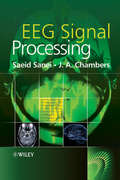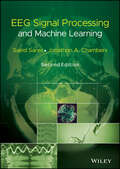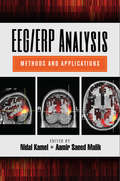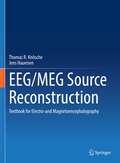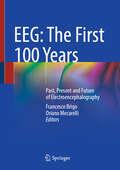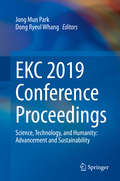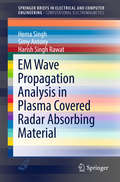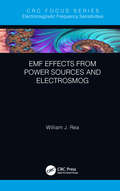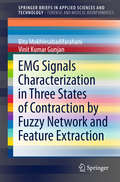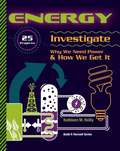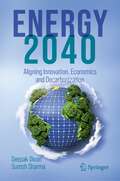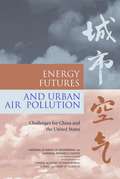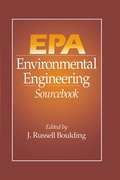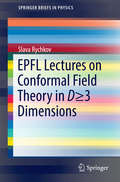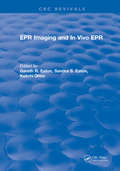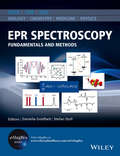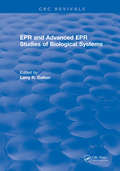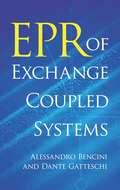- Table View
- List View
EEG Signal Processing
by Saeid Sanei J. A. ChambersElectroencephalograms (EEGs) are becoming increasingly important measurements of brain activity and they have great potential for the diagnosis and treatment of mental and brain diseases and abnormalities. With appropriate interpretation methods they are emerging as a key methodology to satisfy the increasing global demand for more affordable and effective clinical and healthcare services.Developing and understanding advanced signal processing techniques for the analysis of EEG signals is crucial in the area of biomedical research. This book focuses on these techniques, providing expansive coverage of algorithms and tools from the field of digital signal processing. It discusses their applications to medical data, using graphs and topographic images to show simulation results that assess the efficacy of the methods.Additionally, expect to find:explanations of the significance of EEG signal analysis and processing (with examples) and a useful theoretical and mathematical background for the analysis and processing of EEG signals;an exploration of normal and abnormal EEGs, neurological symptoms and diagnostic information, and representations of the EEGs;reviews of theoretical approaches in EEG modelling, such as restoration, enhancement, segmentation, and the removal of different internal and external artefacts from the EEG and ERP (event-related potential) signals;coverage of major abnormalities such as seizure, and mental illnesses such as dementia, schizophrenia, and Alzheimer's disease, together with their mathematical interpretations from the EEG and ERP signals and sleep phenomenon;descriptions of nonlinear and adaptive digital signal processing techniques for abnormality detection, source localization and brain-computer interfacing using multi-channel EEG data with emphasis on non-invasive techniques, together with future topics for research in the area of EEG signal processing.The information within EEG Signal Processing has the potential to enhance the clinically-related information within EEG signals, thereby aiding physicians and ultimately providing more cost effective, efficient diagnostic tools. It will be beneficial to psychiatrists, neurophysiologists, engineers, and students or researchers in neurosciences. Undergraduate and postgraduate biomedical engineering students and postgraduate epileptology students will also find it a helpful reference.
EEG Signal Processing and Machine Learning
by Saeid Sanei Jonathon A. ChambersExplore cutting edge techniques at the forefront of electroencephalogram research and artificial intelligence from leading voices in the field The newly revised Second Edition of EEG Signal Processing and Machine Learning delivers an inclusive and thorough exploration of new techniques and outcomes in electroencephalogram (EEG) research in the areas of analysis, processing, and decision making about a variety of brain states, abnormalities, and disorders using advanced signal processing and machine learning techniques. The book content is substantially increased upon that of the first edition and, while it retains what made the first edition so popular, is composed of more than 50% new material. The distinguished authors have included new material on tensors for EEG analysis and sensor fusion, as well as new chapters on mental fatigue, sleep, seizure, neurodevelopmental diseases, BCI, and psychiatric abnormalities. In addition to including a comprehensive chapter on machine learning, machine learning applications have been added to almost all the chapters. Moreover, multimodal brain screening, such as EEG-fMRI, and brain connectivity have been included as two new chapters in this new edition. Readers will also benefit from the inclusion of: A thorough introduction to EEGs, including neural activities, action potentials, EEG generation, brain rhythms, and EEG recording and measurement An exploration of brain waves, including their generation, recording, and instrumentation, including abnormal EEG patterns and the effects of ageing and mental disorders A treatment of mathematical models for normal and abnormal EEGs Discussions of the fundamentals of EEG signal processing, including statistical properties, linear and nonlinear systems, frequency domain approaches, tensor factorization, diffusion adaptive filtering, deep neural networks, and complex-valued signal processing Perfect for biomedical engineers, neuroscientists, neurophysiologists, psychiatrists, engineers, and students and researchers in the above areas, the Second Edition of EEG Signal Processing and Machine Learning will also earn a place in the libraries of undergraduate and postgraduate Biomedical Engineering and Neuroscience, including Epileptology, students.
EEG/ERP Analysis: Methods and Applications
by Nidal Kamel Aamir Saeed MalikChanges in the neurological functions of the human brain are often a precursor to numerous degenerative diseases. Advanced EEG systems and other monitoring systems used in preventive diagnostic procedures incorporate innovative features for brain monitoring functions such as real-time automated signal processing techniques and sophisticated amplifi
EEG/MEG Source Reconstruction: Textbook for Electro-and Magnetoencephalography
by Jens Haueisen Thomas R. KnöscheThis textbook provides a comprehensive and didactic introduction from the basics to the current state of the art in the field of EEG/MEG source reconstruction. Reconstructing the generators or sources of electroencephalographic and magnetoencephalographic (EEG/MEG) signals is an important problem in basic neuroscience as well as clinical research and practice. Over the past few decades, an entire theory, together with a whole collection of algorithms and techniques, has developed. In this textbook, the authors provide a unified perspective on a broad range of EEG/MEG source reconstruction methods, with particular emphasis on their respective assumptions about sources, data, head tissues, and sensor properties. An introductory chapter highlights the concept of brain imaging and the particular importance of the neuroelectromagnetic inverse problem. This is followed by an in-depth discussion of neural information processing and brain signal generation and an introduction to the practice of data acquisition. Next, the relevant mathematical models for the sources of EEG and MEG are discussed in detail, followed by the neuroelectromagnetic forward problem, that is, the prediction of EEG or MEG signals from those source models, using biophysical descriptions of the head tissues and the sensors. The main part of this textbook is dedicated to the source reconstruction methods. The authors present a theoretical framework of the neuroelectromagnetic inverse problem, centered on Bayes’ theorem, which then serves as the basis for a detailed description of a large variety of techniques, including dipole fit methods, distributed source reconstruction, spatial filters, and dynamic source reconstruction methods. The final two chapters address the important topic of assessment, including verification and validation of source reconstruction methods, and their actual application to real-world scientific and clinical questions.This book is intended as basic reading for anybody who is engaged with EEG/MEG source reconstruction, be it as a method developer or as a user, including advanced undergraduate students, PhD students, and postdocs in neuroscience, biomedical engineering, and related fields.
EEG: Past, Present and Future of Electroencephalography
by Oriano Mecarelli Francesco BrigoAuthored by leading experts, this book explores the key milestones in the 100-year history of the electroencephalogram (EEG). It provides a detailed account of its origins, global development, clinical applications, and lasting impact on neuroscience. By tracing its evolution, the book underscores the EEG&’s enduring relevance. What distinguishes this volume is its dynamic and forward-looking approach. Rather than a traditional historical account, it presents the story of the EEG as an evolving narrative—connecting past discoveries with future possibilities. With advancements in digital technology, machine learning, and artificial intelligence, the EEG remains central to neuroscientific research and a critical diagnostic tool in various medical fields. This book offers valuable insights into the EEG&’s contributions to modern neuroscience and its continued influence. It is intended for neurologists, neuroscientists, neuropsychologists, neurophysiologists, EEG technicians, and medical historians, as well as anyone interested in the development of neuroscience and brain research.
EKC 2019 Conference Proceedings: Science, Technology, and Humanity: Advancement and Sustainability
by Jong Mun Park Dong Ryeol WhangThis volume offers a selection of papers presented at the Europe-Korea Conference on Science and Technology 2019 (EKC 2019). EKC is a multi/inter/transdisciplinary conference covering all fields of science and technology, aiming to facilitate networking and collaboration between academic and industrial researchers involved in R&D, engineering, manufacturing, and application. The scope is broad, with topics covered including physics and mathematics; chemistry, materials and chemical engineering; biology, bioengineering and medical science; Earth science and environmental engineering; architecture, civil and ocean engineering; electrical, electronic, and informational engineering; mechanical, aerospace, naval, and nuclear engineering; and social science.This book showcases a selection of peer-reviewed, high-impact research results which will be of interest to a wide audience.
EM Wave Propagation Analysis in Plasma Covered Radar Absorbing Material
by Hema Singh Simy Antony Harish Singh RawatThis book focuses on EM propagation characteristics within multilayered plasma-dielectric-metallic media. The method used for analysis is impedance transformation method. Plasma covered radar absorbing material is approximated as a multi-layered dielectric medium. The plasma is considered to be bounded homogeneous/inhomogeneous medium. The reflection coefficient and hence return loss is analytically derived. The role of plasma parameters, such as electron density, collision frequency, plasma thickness, and plasma density profile in the absorption behavior of multi-layered plasma-RAM structure is described. This book provides a clearer picture of EM propagation within plasma. The reader will get an insight of plasma parameters that play significant role in deciding the absorption characteristics of plasma covered surfaces.
EMBOSS Administrator's Guide
by Dr Alan Bleasby Dr Jon Ison Mr Peter Rice Dr Alan Bleasby Dr Jon IsonThe European Molecular Biology Open Software Suite (EMBOSS) is a high quality package of open source software tools for molecular biology. It includes over 200 applications integrated with a range of popular third party software packages under a consistent and powerful command line interface. The tools are available from a wide range of graphical interfaces, including easy to use web interfaces and powerful workflow software. The EMBOSS Administrator's Guide is the official, definitive and comprehensive guide to EMBOSS installation and maintenance: • Find all the information needed to configure, install and maintain EMBOSS, including recent additions for version 6. 2 • Step-by-step instructions with real-world examples – saves you time and helps you avoid the pitfalls on all the common platforms • In-depth reference to database configuration – learn how to set up and use databases under EMBOSS • Includes EMBOSS Frequently Asked Questions (FAQ) with answers – quickly find solutions to common problems
EMBOSS Developer's Guide:
by Mr Peter Rice Dr Alan Bleasby Dr Jon Ison Dr Jon Ison Mr Peter RiceThe European Molecular Biology Open Software Suite (EMBOSS) is a high quality, well documented package of open source software tools for molecular biology. EMBOSS includes extensive and extensible C programming libraries, providing a powerful and robust toolkit for developing new bioinformatics tools from scratch. The EMBOSS Developer's Manual is the official and definitive guide to developing software under EMBOSS. It includes comprehensive reference information and guidelines, including step-by-step instructions and real-world code examples: • Learn how to write fully-featured tools guided by the people who developed EMBOSS • Step-by-step guide to writing EMBOSS applications, illustrated with functional, deployed code • ACD file development – learn how to customise existing tools without coding, or design and write entirely new application interfaces • EMBOSS API programming guidelines – quickly master application development • Wrapping and porting applications under EMBOSS – learn how to incorporate third-party tools
EMF Effects from Power Sources and Electrosmog (Electromagnetic Frequency Sensitivities)
by William J. ReaThe field of electromagnetic sensitivity is the new epidemic of the 21st century, and can cause disease of the automatic nerve system in any part of the body. This is as a result of chemical sensitivity, in which over 80,000 chemicals are involved, resulting in innumerable combinations. A cursory understanding of the combinations can help clinicians partially understand the associated problems and thus help in the diagnosis and treatment of electromagnetic sensitivities. But a basic understanding of environmentally induced illness and healing must first be understood by the clinicians before diseases occur such as cardiac arrhythmia, muscle spasms, and nerve pain. Key Features: Describes how an understanding of the vast combinations of electrical and chemical sensitivities will help in the diagnosis and treatment of electromagnetic sensitivities Reveals the complexity and multi-faceted presentation often seen in chemical sensitivity and chronic degenerative disease cases Provides information backed up by rigorous scientific data including hundreds of tables and figures as online resources Features a Dedication to Robert Becker, MD, an orthopedic surgeon who was one of the first clinicians to recognize the significance of EMF in medicine and surgery, and also to his assistant Andrew Marino, PhD, who helped develop the basic science of orthopedic electromagnet healing
EMG Signals Characterization in Three States of Contraction by Fuzzy Network and Feature Extraction
by Bita Mokhlesabadifarahani Vinit Kumar GunjanNeuro-muscular and musculoskeletal disorders and injuries highly affect the life style and the motion abilities of an individual. This brief highlights a systematic method for detection of the level of muscle power declining in musculoskeletal and Neuro-muscular disorders. The neuro-fuzzy system is trained with 70 percent of the recorded Electromyography (EMG) cut off window and then used for classification and modeling purposes. The neuro-fuzzy classifier is validated in comparison to some other well-known classifiers in classification of the recorded EMG signals with the three states of contractions corresponding to the extracted features. Different structures of the neuro-fuzzy classifier are also comparatively analyzed to find the optimum structure of the classifier used.
EMR/ESR/EPR Spectroscopy for Characterization of Nanomaterials
by Ashutosh Kumar ShuklaThe subject matter of this book is the application of EMR/ESR/EPR spectroscopy for characterization of nanomaterials. Initial chapters deal with nanomaterials and their classification. Characterization of metallic nanoparticles, metal oxide nanoparticles and rare earth impurity doped nanoparticles from the (ESR) spectrum parameters are covered in the chapters that follow. A special feature of the book is EMR/ESR/EPR spectroscopic characterization of nanoparticles which are important due to their bactericidal and anticancerous properties. Strength of continuous wave (CW) is explained with the help of suitable examples. The book focuses on applications and data interpretation avoiding extensive use of mathematics so that it also caters to the need of young scientists in the life science disciplines. The book includes a comparison with other spectroscopic characterization methods so as to give an integrated approach to the reader. It will prove useful to biomedical scientists and engineers, chemists, and materials engineers in student, researcher, and practitioner positions.
ENERGY
by Kathleen M ReillyEnergy is a vital part of our lives. It powers our computer, lights our home, and moves our car. It also costs a lot of money and pollutes our environment. In Energy: 25 Projects Investigate Why We Need Power and How We Get It, kids ages 9-12 learn about the history and science of the world's energy sources, from nonrenewable fossil fuels such as oil and natural gas to renewable sources such as solar and wind power.Sidebars and fun trivia break up the text, making it easily accessible and engaging, while hands-on projects encourage active learning. Requiring little adult supervision and using supplies commonly found in most households, activities range from constructing a battery to recreating an oil spill to see howdifficult cleanup can be.By exploring the advantages and disadvantages of each energy source, kids will gain insight into the future of energy and its impact on our planet.
ENERGY 2040: Aligning Innovation, Economics and Decarbonization
by Deepak Divan Suresh SharmaAccess to energy is essential for our daily lives, economic growth, environment, and sustainability. However, our use of fossil fuels has contributed to global climate change, which poses a significant threat to society and life on this planet. Yet, it has been challenging to reconcile the perceived conflict between economics and climate change, which has created deep divisions in our society. ENERGY 2040: Aligning Innovation, Economics, and Decarbonization provides a holistic and comprehensive analysis of the ongoing energy transition and its underlying causes. It presents a viable path to meet the energy, economic, and climate goals by weaving together science, technology, economics, policy, entrepreneurship, and geopolitics. The book presents a captivating narrative that brings together a range of topics, including new and disruptive technologies with steep learning rates, the challenges of the future power grid, the democratization of energy, and reducing the timeline from science to impact at scale. It also explores the complex role of scientific research, disruptive deep tech, entrepreneurship, and policy in accelerating this energy transformation. This book is a must-read for anyone interested in understanding the future of energy. Whether you're a scientist, energy-industry practitioner, policymaker, investor, student, or concerned citizen, this book offers critical insights into the complex and evolving world of energy, innovation, decarbonization, and climate change.
ENERGY FUTURES AND URBAN AIR POLLUTION: Challenges for China and the United States
by National Academy of Engineering National Research Council of the National AcademiesThe United States and China are the top two energy consumers in the world. As a consequence, they are also the top two emitters of numerous air pollutants which have local, regional, and global impacts. Urbanization has led to serious air pollution problems in U.S. and Chinese cities; although U.S. cities continues to face challenges, the lessons they have learned in managing energy use and air quality are relevant to the Chinese experience. This book summarizes current trends, profiles two U.S. and two Chinese cities, and recommends key actions to enable each country to continue to improve urban air quality.
ENZYMES: Catalysis, Kinetics and Mechanisms
by N. S. PunekarThis enzymology textbook for graduate and advanced undergraduate students covers the syllabi of most universities where this subject is regularly taught. It focuses on the synchrony between the two broad mechanistic facets of enzymology: the chemical and the kinetic, and also highlights the synergy between enzyme structure and mechanism. Designed for self-study, it explains how to plan enzyme experiments and subsequently analyze the data collected. The book is divided into five major sections: 1] Introduction to enzymes, 2] Practical aspects, 3] Kinetic Mechanisms, 4] Chemical Mechanisms, and 5] Enzymology Frontiers. Individual concepts are treated as stand-alone chapters; readers can explore any single concept with minimal cross-referencing to the rest of the book. Further, complex approaches requiring specialized techniques and involved experimentation (beyond the reach of an average laboratory) are covered in theory with suitable references to guide readers. The book provides students, researchers and academics in the broad area of biology with a sound theoretical and practical knowledge of enzymes. It also caters to those who do not have a practicing enzymologist to teach them the subject.
ENZYMES: Catalysis, Kinetics and Mechanisms
by Narayan S. PunekarThe second edition of the textbook Enzymes- Catalysis, Kinetics, and Mechanisms focuses on the two broad mechanistic facets of enzymology namely, the chemical and the kinetic. It endeavors to bring out the synergy between enzyme structures and mechanisms. Written with a self-study approach in mind, the emphasis is on how to begin experiments with an enzyme and subsequently analyze the data. The book is divided into six major sections– 1) Enzyme Catalysis – A Perspective, 2) Enzyme Kinetic Practice and Measurements, 3) Elucidation of Kinetic Mechanisms, 4) Chemical Mechanisms and Catalysis, 5) Exploiting Enzymes, and 6) An end piece on Frontiers in Enzymology. The individual concepts are treated as stand-alone short sections. In case the reader needs to use any one concept, it should be possible with minimal cross-referencing to the rest of the book. Further, the book presents specialized techniques and complex approaches that require involved experimentation in theory with suitable references to guide the reader. The book is proposed more as a textbook in a self-learning mode to students of modern biology, particularly those with limited exposure to quantitative aspects and organic chemistry.
EPA Environmental Engineering Sourcebook
by J. Russell BouldingThe U.S. Environmental Protection Agency (U.S. EPA) publishes several series of documents that provide up-to-date information about environmental site assessment and remediation. The EPA Environmental Engineering Sourcebook includes papers and bulletins that focus on remediation of soil and groundwater, making them available in a convenient form.This book compiles thirty-five documents- written by recognized leaders - on major methods and promising new techniques for hazardous waste treatment and site remediation. Each chapter evaluates the type of contaminant and site characteristics needed to select a technology for use at hazardous waste sites.The EPA Environmental Engineering Sourcebook presents EPA documents in an easy-to-use, concise format. It contains numerous graphs, charts and figures that make it an important resource for those involved in environmental protection, site remediation, and site assessment. FeaturesContains chapters written by recognized leadersExamines major methods as well as assesses new techniques for hazardous waste treatment and site remediationPresents information in an easy-to-use, concise formatEvaluates each type of contaminant and site characteristics for selecting technology at hazardous waste sites
EPFL Lectures on Conformal Field Theory in D ≥ 3 Dimensions
by Slava RychkovThis primer develops Conformal Field Theory (CFT) from scratch, whereby CFT is viewed as any conformally-invariant theory that describes a fixed point of a renormalization group flow in quantum field theory. The book is divided into four lectures: Lecture 1 addresses the physical foundations of conformal invariance, while Lecture 2 examines the constraints imposed by conformal symmetry on the correlation functions of local operators, presented using the so-called projective null cone - a procedure also known as the embedding formalism. In turn, Lecture 3 focuses on the radial quantization and the operator product expansion, while Lecture 4 offers a very brief introduction to the conformal bootstrap. Derived from course-based notes, these lectures are intended as a first point of entry to this topic for Master and PhD students alike.
EPR IMAGING and IN VIVO EPR
by Gareth R. EatonThis volume provides a detailed examination of the physical basis for EPR imaging and in vivo EPR spectroscopy, experimental arrangements, and data analysis. The EPR imaging methods described include continuous wave, spin-echo-detected and ENDOR-detected EPR with constant, stepped, modulated, and pulsed magnetic field gradients. Applications described include inhomogeneous materials, diffusion kinetics, reaction kinetics, orientation of liquid crystals, microwave distributions, magnetic field distributions, superconductors, radiation damage, and defects in solids. The book also covers other topics important to in vivo studies, including in vivo EPR spectroscopy, low-frequency EPR, state-of-the-art low-frequency EPR instruments, achievable sensitivity, and spin labels. The book will be of great interest to graduate students, researchers, and medical instrument developers who use EPR, as well as clinicians and chemists interested in the relationship between in vivo radicals (such as superoxide and diseases).
EPR Spectroscopy
by Gunnar Jeschke Malte DrescherEPR Spectroscopy in Catalysis, by Sabine Van Doorslaer und Damien M. Murphy Radicals in Flavoproteins, by Erik Schleicher und Stefan Weber EPR Spectroscopy in Polymer Science, by Dariush Hinderberger EPR in Protein Science, by Intrinsically Disordered Proteins, by Malte Drescher Site-Directed Spin Labeling of Membrane Proteins, by Enrica Bordignon Structure and Dynamics of Nucleic Acids, by Ivan Krstić, Burkhard Endeward, Dominik Margraf, Andriy Marko und Thomas F Prisner New Directions in Electron Paramagnetic Resonance Spectroscopy on Molecular Nanomagnets, by J. van Slageren
EPR Spectroscopy: Fundamentals and Methods (eMagRes Books)
by Daniella Goldfarb Stefan StollThis unique, self-contained resource is the first volume on electron paramagnetic resonance (EPR) spectroscopy in the eMagRes Handbook series. The 27 chapters cover the theoretical principles, the common experimental techniques, and many important application areas of modern EPR spectroscopy. EPR Spectroscopy: Fundamentals and Methods is presented in four major parts: A: Fundamental Theory, B: Basic Techniques and Instrumentation, C: High-Resolution Pulse Techniques, and D: Special Techniques. The first part of the book gives the reader an introduction to basic continuous-wave (CW) EPR and an overview of the different magnetic interactions that can be determined by EPR spectroscopy, their associated theoretical description, and their information content. The second provides the basics of the various EPR techniques, including pulse EPR, and EPR imaging, along with the associated instrumentation. Parts C and D builds on parts A and B and offer introductory accounts of a wide range of modern advanced EPR techniques, with examples of applications. The last two parts presents most of the new advances that do not appear in most of the classical EPR textbooks that focus on CW EPR. EPR Spectroscopy: Fundamentals and Methods contains, in concise form, all the material needed to understand state-of-the-art EPR spectroscopy at the graduate school/research level, whilst the editors have ensured that it presents the topic at a level accessible to newcomers to the field and others who want to know its range of application and how to apply it.
EPR and Advanced EPR Studies of Biological Systems
by Larry R. DaltonThis work is written to provide a qualitative introduction, appropriate for a general science audience, to the application of pragmagnetic resonance to the determination of biomolecular dynamics. The work is also intended as a reference resource for those pursuing or contemplating research in the hydrodynamics. The work is also intended as a reference resource for those pursuing or contemplating research in the hydrodynamic characterization of components of Biosystems. Thus, the Introduction, Theory, and Methodology sections involve presentations at two levels � a pictorial and intuitive presentation for the generalist and a quantitative presentation for the specialist. The sections on applications provide a critical discussion of both pure and applied research applications which yields insights into both the capabilities and limitations of the methodology. The applications sections are also of interest from the standpoint of the detailed characterization of certain Biosystems, such as erythrocytes, which have evolved from EPR measurements.
EPR of Exchange Coupled Systems (Dover Books on Chemistry)
by Dante Gatteschi Alessandro BenciniFrom chemistry to solid state physics to biology, the applications of Electron Paramagnetic Resonance (EPR) are relevant to many areas. This unified treatment is based on the spin Hamiltonian approach and makes extensive use of irreducible tensor techniques to analyze systems in which two or more spins are magnetically coupled. This edition contains a new Introduction by coauthor Dante Gatteschi, a pioneer and scholar of molecular magnetism.The first two chapters review the foundations of exchange interactions, followed by examinations of the spectra of pairs and clusters, relaxation in oligonuclear species, approaches to infinite lattices, and how EPR can provide firsthand information on spin dynamics. Subsequent chapters explore experimental data, magnetically coupled systems, low-dimensional materials, and the use of EPR to characterize excitons and exciton motion. More than 200 figures and tables appear throughout the book, which concludes with a pair of helpful appendices.
EPR of Free Radicals in Solids II
by Anders Lund Masaru ShiotaniEPR of Free Radicals in Solids: Trends in Methods and Applications, 2nd ed. presents a critical two volume review of the methods and applications of EPR (ESR) for the study of free radical processes in solids. Emphasis is on the progress made in the developments in EPR technology, in the application of sophisticated matrix isolation techniques and in the advancement in quantitative EPR that have occurred since the 1st edition was published. Improvements have been made also at theoretical level, with the development of methods based on first principles and their application to the calculation of magnetic properties as well as in spectral simulations. EPR of Free Radicals in Solids II focuses on the trends in applications of experimental and theoretical methods to extract structural and dynamical properties of radicals and spin probes in solid matrices by continuous wave (CW) and pulsed techniques in nine chapters written by experts in the field. It examines the studies involving radiation- and photo-induced inorganic and organic radicals in inert matrices, the high-spin molecules and metal-based molecular clusters as well as the radical pro-cesses in photosynthesis. Recent advancements in environmental applications in-cluding measurements by myon resonance of radicals on surfaces and by quantitative EPR in dosimetry are outlined and the applications of optical detection in material research with much increased sensitivity reviewed. The potential use of EPR in quantum computing is considered in a newly written chapter. This new edition is aimed to experimentalists and theoreticians in research involving free radicals, as well as for students of advanced courses in physical chemis-try, chemical physics, materials science, biophysics, biochemistry and related fields.
